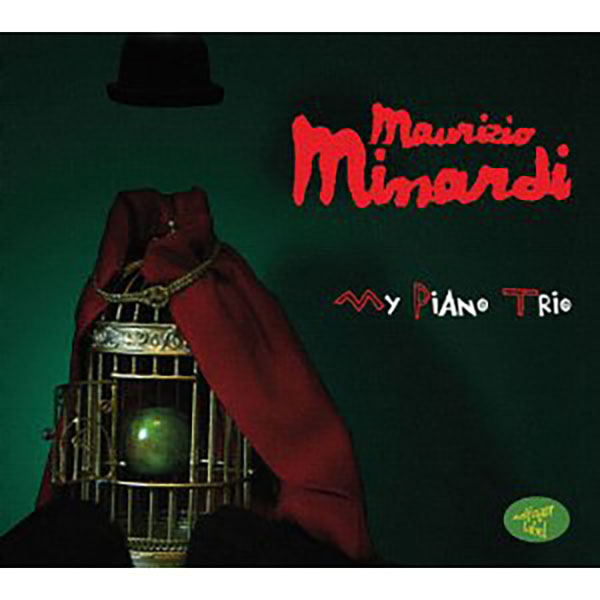
by Ian Mann
July 10, 2012
/ ALBUM
Lyrical, intelligent, contemporary piano jazz with its roots in the European classical tradition and beyond.
Maurizio Minardi
“My Piano Trio”
(Belfagor Label MM10)
The Italian pianist and composer Maurizio Minardi has lived in London since 2008 and has subsequently worked with a variety of jazz musicians including Quentin Collins, Brandon Allen, Yuri Goloubev, Asaf Sirkis, Maciek Pysz and Antonio Forcione as well as with Portugese singer Carmen Souza and even with the Royal Shakespeare Company. He has also written songs for Italian pop singers such as Gianni Morandi and had had his work remixed by DJ Paul Murphy.
Minardi has been the driving force behind the jazz tango group Quartetto Magritte (where he also plays accordion) and the fusion group Oz but he has always also played in the piano trio format and this latest release showcases both the British and Italian versions of his groups. Three of the album’s selections were recorded in London in 2011 in the company of double bassist Nick Pini and drummer Jason Reeve. The remaining pieces were recorded in Bologna in 2010 with bassist Felice Del Gaudio and drummer Roberto Rossi. It was also in Bologna that Minardi completed his studies in piano, organ and composition at the city’s Dams University.
Minardi’s classical training is clearly audible in the music of the trio as is his fascination with tango. His music covers a variety of styles and is highly descriptive and sometimes densely rhythmic but always with a strong classical influence. He cites E.S.T. as a key inspiration (the Swedish trio led by the late pianist Esbjorn Svensson have been profoundly influential on virtually all contemporary piano trios) alongside the music of film composers Ennio Morricone, Nino Rota, Yann Tiersen and Michael Nyman.
The album begins with two pieces from the London based trio. “Shiny” begins with the sound of Minardi’s unaccompanied arpeggios before Reeve and Pini establish a hip hop style groove that evokes the inevitable comparisons with E.S.T. The piece is punctuated by a lyrical central episode featuring the rich sounds of Pini’s bass and Minardi’s light, classically inspired piano touch. The broken beat groove then returns for the brief closing section.
Featuring the same trio the lengthier, more atmospheric “Poppies” reveals Minardi’s gift for melody and features another excellent performance from Pini who again solos extensively. Reeve’s sympathetic, neatly detailed drumming also serves the trio well.
The first item from the all Italian line up is “Einaudito”, like “Poppies” taken at a slow to medium tempo but more obviously song like in its construction. Once again Minardi gives a degree of prominence to his bassist, in this instance Felice Del Gaudio. Roberto Rossi’s are economic but functional and effective.
“Perludio” is the final item from the “English” trio and combines classically derived structures with a jazz feel on a piece that progresses through varying sections with Pini again featuring prominently as he solos above Minardi’s insistent piano chording. Reeve’s drumming is colourful and neatly energetic, sympathetic and once again exhibiting a fine eye for detail.
Recorded in Bologna but presumably inspired by London “Clapham Park” features lengthy passages of flowingly lyrical solo piano with Del Gaudio providing occasional accompaniment on double bass, his tone huge and resonant.
The reflective mood is continued on “Canicola” with Del Gaudio again making a significant contribution with his deep, lyrical sound. Rossi’s brushwork is feather light and finely nuanced.
The rippling arpeggios of “Magritte” (the title a nod in the direction of Minardi’s jazz/tango ensemble) provide the backdrop for yet more excellent work from the dexterous Del Gaudio. Minardi is fond of interlocking rhythmic patterns with this piece representing a particularly good example as the music unfolds and develops.
“Tulipano Nero” expands on this in more animated fashion with taut, repetitive, classically inspired piano patterns meshing with economical grooves to produce music with a compelling insistence. A more impressionistic central passage allows drummer Rossi the freedom to roam using a variety of sticks and mallets before the trio give a brief restatement of the main theme.
The closing “Breton” is a starkly beautiful ballad with Minardi’s piano lyricism enhanced by Del Gaudi’s richly resonant bass and Rossi’s mallet rumbles and well judged cymbal work.
There’s something of a bonus in the form of a remixed version of “Magritte”, recorded in Bologna and featuring looped arco bass, a more contemporary drum groove and a modest degree of other electronica. The overall effect is to enhance the layering process already alluded to in some of the earlier piano trio pieces.
“My Piano Trio” is a neatly crafted album full of intriguing compositional ideas and some excellent playing from both sets of musicians. Minardi has a light, classically honed touch at the piano but there’s little conventional jazz soloing. Instead Minardi adopts a role as the fulcrum of the trio , subtly dictating the course of the music. However he nonetheless encourages a strong sense of democracy within both groups with bassists Pini and Del Gaudio both allowed a generous amount of solo space which they exploit superbly. Both drummers display a commendable sensitivity and exhibit a fine eye for detail in their intelligent, quietly colourful contributions. If the album has a fault it’s a tendency towards “one pace-dom” and there’s sometimes a feeling that the music is over disciplined with nobody really getting the chance to cut loose. Nevertheless the album has much to commend it, lyrical, intelligent contemporary piano jazz with its roots in the European classical tradition and beyond.
Minardi will be appearing at Oliver’s Jazz Bar in Greenwich, London on the evening of July 21st 2012 with a trio featuring Pini and drummer Pharoah Russell. It will be interesting to see how he develops this music in a live context. Full details of the event plus further information relating to Minardi’s musical activities can be found at http://www.minardimaurizio.com
blog comments powered by Disqus